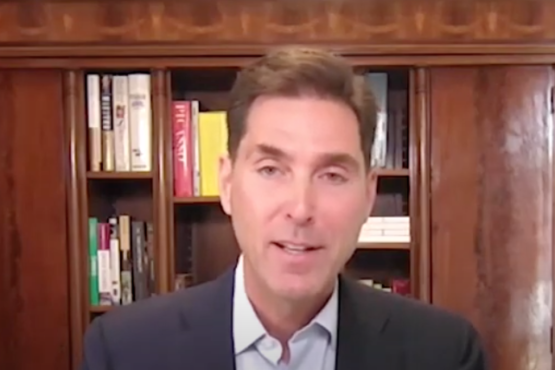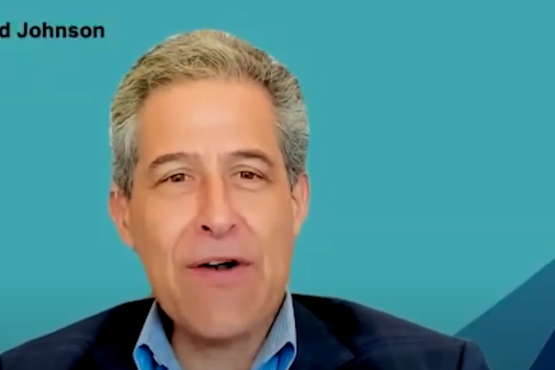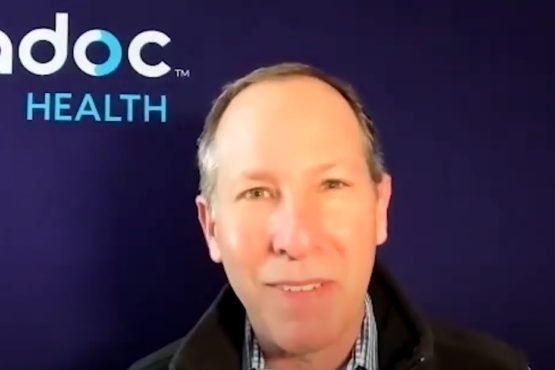Now, you might be surprised to hear a new voice this week, but like you, I’ve been following Senator Frist’s podcast through the entirety of this first season. I have really enjoyed reacquainting myself with colleagues and learning new perspectives from leaders on the cutting edge of healthcare policy, medicine, and innovation.
A little bit about myself, I’m a Nonresident Fellow at the Brookings Institution and an advisor to the Bipartisan Policy Center. I’m also a practicing primary care internist at Johns Hopkins Medicine and previously served in the Obama Administration as director of policy for the Office of Intergovernmental Affairs and Public Engagement in the White House.
I live in Washington, DC, and know for a fact that this podcast is a source of conversation amongst my peers. I’m also proud to be a long-time friend and colleague of Senator Frist. So, I am very excited that he invited me to participate with him on the podcast.
As I was listening to the first season, I made some notes on some of the most important insights that I learned from Senator Frist’s interviews with his guests. From there, I’ve created a compilation of what I perceive to be some of the more stand-out moments.
This first episode centers around the rapidly evolving world of Innovation, specifically – as it pertains to health and healthcare.
Senator Frist: Tell me exactly what you do, or give me an example of what you do. What does myNEXUS actually do?
McArthur V.: myNEXUS, we’re a technology-enabled service platform. We receive patients that are in need of post-acute care and home care through our technology platform, primarily coming out of a hospital setting. Those patients are getting referred into our tech platform based on the clinical criteria around that patient. It flushes through a set of proprietary algorithms that we’ve developed over the course of time that identifies what that patient needs across their episode of post-acute care. myNEXUS has a delivery network of post-acute providers across the country that deliver care according to those care protocols and clinical guidelines and ultimately result in a high-quality outcome for that post-acute episode in a very efficient manner from a cost perspective.
McArthur V.: I saw this huge opportunity to be this centralizing force to standardize these episodes of post-acute care and home care, get greater value out of the episodes of care, and ultimately lead to higher quality outcomes. I really like to empower my senior team to be successful. I think that there are times in your life where you want to be the person that’s standing up in the board room and doing all the talking and making every single decision on your own and not allowing your team to step up and shine. I’ve taken a completely different approach at this point and really focused on assembling the right team, assembling a very well-rounded team, and then empowering that team to be leaders to demonstrate value.
McArthur V.: I have a fundamental belief that more episodes can be delivered in a home environment and outside of a facility-based setting, which is really what our technology and our care guidelines are proving out over time. If I’ll look back on myNEXUS 10 or 20 years from now, I think that what I’ll be most proud of is that we started to, A, manage more care in the home, but B, manage care in a more proactive manner versus a reactive manner.
Dr. Kavita Patel: Aaron Gani is the founder and CEO of BehaVR, LLC, which creates digital therapeutics for behavioral health through the unmatched psychological power of virtual reality. He is on the cutting edge of creating innovative consumer-centered technological solutions to some of our major health challenges. Aaron previously served as chief technology officer of Humana and is a founding member of the Strategic Advisory Board at the Digital Medicine Society.
Aaron Gani: I knew that I wanted to take on a really, really big important problem. There is no bigger problem than helping people improve their health at the scale that we need to to reverse chronic disease and the unsustainable spending. The way I like to describe it to people is if we use technology to create a multisensory set of inputs to our brain, our brain then processes that in a way that because the sensory input comes through the same channels that we experience daily life through, it feels very real. Your prefrontal cortex may be saying, “Well, I know this is a simulation,” but the rest of your brain, so your lizard brain, really kind of can’t tell the difference. It all of that experience of the world comes in in a way that feels natural. In some number of years in the future, it will be much more common for the average consumer to have virtual reality and augmented reality technology around their house. Some folks describe it as it’ll be like a toaster. You don’t use it every day, but when you need it, it’s there.
Dr. Kavita Patel: Justin Lanning is a social entrepreneur dedicated to making a meaningful impact on the national opioid crisis. He has created a private sector solution using the latest medical research and a capitated value-based model that partners with Medicaid managed care organizations for improved outcomes and real savings.
Justin Lanning: We brought new capital into the market that didn’t exist and so that we could approach the health plans who are already at risk for these lives. We just said, “Let us bring a model to bear that we’re going to bring our capital and you’re going to pay us for the outcome,” while we’re saving tens and tens and tens of thousands of dollars per baby in just the first four months of life. Over the lifespan, we’ve calculated, it’s in the hundreds of hundreds of thousands of dollars that we’re saving.
Dr. Kavita Patel: Paul Ketchel worked for over two decades with Senator Frist in Washington as a top technology advisor and is the founder of MDSave, the world’s first transactional healthcare marketplace. MDSave empowers patients to compare prices for healthcare services upfront and is a champion for transparency in the healthcare world.
Paul Ketchel: What we really do is it’s a way for patients to save on medical care. Think of it a lot like it’s Expedia for healthcare. We bundle together healthcare services, and then we offer those to the public at a discounted rate, usually 40-60% lower than an insurance rate, and then in exchange, we collect the payment upfront and pay those providers in six days or less. One of the biggest misnomers that was told to be like through elementary school, not just by my parents, but by teachers and other folks, there was this idea that if you didn’t have access to wealth, you could never build these companies. That’s the most damaging advice you could give children or young entrepreneurs coming up. If you’ve got a good idea and you got conviction and you believe in yourself, you can find capital.
Dr. Kavita Patel: Dr. Freddy Abnousi is a practicing interventional cardiologist and head of Facebook’s healthcare research. Dr. Abnousi also serves as an innovation advisor to the American College of Cardiology and assistant professor adjunct at Yale University School of Medicine.
Dr. Freddy A.: As a father, I’ve got three little kids, and my hope is that we don’t have to wait for the system to break down with each one of my children before we put them on the right path. I think of it the same way for my parents as I want them to prevent getting disease rather than get a disease and then treat it. For that purpose, I think it behooves us as a population to spend more time thinking about prevention and less time perhaps focus on rescuing those people from the abyss.
Dr. Freddy A.: In fact, you know this better than I do, but if you’re ill, this place, this country is the greatest place to be, but if you’re well, there’s really not much for you. Everybody comments about the medical care, sick care versus health care, and I think from my perspective, the best good we could do is try to prevent people from getting ill in the first place. To do that, you have to understand what the primary drivers of health outcomes are in America, and then if you do that, the next step becomes, well, it looks like the biggest bucket we’re not really focused on for prevention happens to the social and behavior variables, so let’s try and take a crack at figuring that out.
Dr. Kavita Patel: Last, but not least, number six is my good Jeff Goldsmith. Jeff Goldsmith is president of Health Futures Inc and national advisor to Navigant Healthcare. For over a decade, Jeff was a lecturer in the graduate School of Business at the University of Chicago on health services management and policy of which he is one of the nation’s foremost health industry analysts. He also specializes in corporate strategy, trend analysis, health policy, and emerging technologies, all while having an amazing sense of humor.
Jeff Goldsmith: If I’m a patient, I want decisions made based on good information, but to me, the heart of the matter is the relationships that are in the heart of medicine. I think that’s the part that’s broken, and it is more broken than the lack of information. You could get discouraged looking at the macro indicators in a society as complicated as our health system or a health system is complicated as a Vanderbilt Medical Center, but my optimism came from actually using the medical care system and seeing all these brilliant young people that really put themselves out there to help me. That part, you lose sight of it. When you’re going to meetings and you’re reading journals, you don’t see any of that stuff. You don’t feel it. That part, the personal part, the interaction with the people that are trying to help me solve a major problem in my life, that’s the part that I’ve found just stirring.
Dr. Kavita Patel: Thanks for listening to today’s podcast of A Second Opinion. You can subscribe to A Second Opinion on Apple podcasts or wherever you are listening right now, and be sure to rate and review A Second Opinion so others can discover what you’re already enjoying. You can get more information about the show, its guests and sponsors at asecondopinionpodcast.com. I’m Dr. Kavita Patel, and I look forward to being with you again soon.


